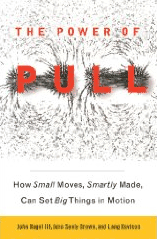Here are some of the key, Power of Pull insights Braden Kelley picked up from our forum at the Biznik Innovators event:
- Don't focus on employee satisfaction. Often the most passionate people are the most frustrated. In the typical organization about 20% of the employees are passionate and 80% are not. This percentage is inversely correlated with corporation size. - JH
- "Extreme performance only comes from people who are passionate." - JSB
- Compactness Theorem - Kids need to link, then lurk, then join - JSB
- Spikes are places where you have a concentration of people focused on the same thing. When it comes to spikes in today's flat world, you can either go there, or try to pull them to you or pull them together. - JSB
- John Hagel told a story about Chris Anderson, Wired magazine editor and his side-project - Drone aircraft - and how he found a guy to be his CTO who knew more than anyone else about drone aircraft - only to find out he was a 19-year old high school dropout from Tijuana. He never would have found him via a traditional search.
- It would be helpful if we changed education system for the new world, but change can start without it - JH
- John Seely Brown talked about how construction contractors are actually good examples of 'pull' because of the underlying trust networks.
- The process of idea appropriation is very social and the best ideas do not always win. - JSB
- Our identities are shifting from consumption to creation. Who has used what you've created? What have you learned from it? - JH
- It used to be that what was important was 'What I own and control', but now 'I am what I build, share, and what others build on' - JSB
- Firms are focused on scalable efficiencies and need to switch to scalable learning. - JSB
- Handling exceptions is an opportunity for all employees to be creative - JSB
- Passionate people who leave organizations are incredibly important to innovation ecosystems. They often help start the next wave of innovation. - JSB
- 75% of business change initiatives fail. Most that succeed are threat-based. - JH
- Business relationships must create mutual value or they end quickly. - JSB
- You can't control serendipity but you can shape it. - JH




